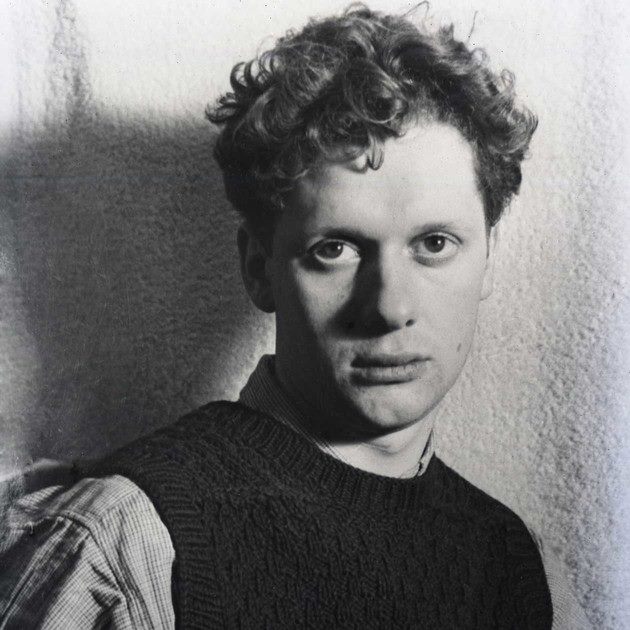
DYLAN THOMAS
Nel mio mestiere o arte ombrosa
Nel mio mestiere o arte ombrosa
praticata nella notte quieta
quando solo la luna s’infiamma
e gli amanti riposano a letto
con tutti i dolori nelle braccia,
il mio lavoro è cantare la luce
non per ambizione o pane,
non per vanagloria o commercio di incanti
su impalcature in avorio
ma per il modesto salario
del loro più segreto cuore.
Non scrivo per l’uomo orgoglioso
che si ritrae nella furia di luna
su questo zampillo di pagine,
non per i morti che torreggiano
con i loro usignoli e salmi
ma per gli amanti che abbracciano
i dolori di tutte le età,
e non offrono lodi o compensi
incuranti del mio mestiere o arte.
In my craft or sullen art
Exercised in the still night
When only the moon rages
And the lovers lie abed
With all their griefs in their arms,
I labour by singing light
Not for ambition or bread
Or the strut and trade of charms
On the ivory stages
But for the common wages
Of their most secret heart.
Not for the proud man apart
From the raging moon I write
On the spindrift pages
Not for the towering dead
With their nightingales and psalms
But for the lovers, their arms
Round the griefs of the ages,
Who pay no praise or wages
Nor heed my craft or art.
Dylan Thomas
da Collected poems 1934-1952, Dent, 1952
E la morte non avrà più dominio
E la morte non avrà più dominio.
I nudi morti saranno una cosa sola
Con l’uomo nel vento, con l’ovest di luna;
Quando le ossa saranno scarnate, le loro ossa ripulite e andate
Avranno stelle al gomito e sul piede;
Benché alienati, saranno sani,
Benché sprofondati negli abissi, avranno nuova vita;
Se gli amanti sono perduti, l’amore non lo è.
E la morte non avrà più dominio.
E la morte non avrà più dominio
Nelle volute del mare
Saranno supini, ma senza morire nel vento;
Si torceranno sui graticci mentre cedono i tendini,
Eppure, legati a una ruota, sapranno resistere;
Si spaccherà la loro fede nei palmi
l’unicorno del male li squarcerà da parte a parte;
Ma trafitti in ogni dove, non si arrenderanno;
E la morte non avrà più dominio.
E la morte non avrà più dominio.
Non potranno ascoltare il gemito dei gabbiani,
Il frangersi delle onde sulla costa;
Dove spuntò un fiore non potrà spuntarne un altro
O alzare la testa agli strali della pioggia;
Ma benché pazzi e morti stecchiti
Le loro teste saranno flagelli di margherite;
Punteranno al sole fino a sgretolarlo,
E la morte non avrà più dominio.
*
And death shall have no dominion.
Dead men naked they shall be one
With the man in the wind and the west moon;
When their bones are picked clean and the clean bones gone,
They shall have stars at elbow and foot;
Though they go mad they shall be sane,
Though they sink through the sea they shall rise again;
Though lovers be lost love shall not;
And death shall have no dominion.
And death shall have no dominion.
Under the windings of the sea
They lying long shall not die windily;
Twisting on racks when sinews give way,
Strapped to a wheel, yet they shall not break;
Faith in their hands shall snap in two,
And the unicorn evils run them through;
Split all ends up they shan’t crack;
And death shall have no dominion.
And death shall have no dominion.
No more may gulls cry at their ears
Or waves break loud on the seashores;
Where blew a flower may a flower no more
Lift its head to the blows of the rain;
Though they be mad and dead as nails,
Heads of the characters hammer through daisies;
Break in the sun till the sun breaks down,
And death shall have no dominion.
Dylan Thomas
da Collected Poems 1934-1952, Dent, 1952
Traduzioni di Giovanni Ibello
Dylan Thomas (Swansea, 27 ottobre 1914 – New York, 9 novembre 1953) è stato un poeta, scrittore e drammaturgo gallese. Nel corso di una vita straordinariamente intensa, per quanto breve, Dylan Thomas ha scritto poesie, saggi, sceneggiature, racconti (molti a sfondo autobiografico) e un dramma teatrale dal titolo Sotto il bosco di latte la cui versione radiofonica ha vinto il Prix Italia nel 1954. Figlio di un professore della grammar school di Swansea, Dylan Thomas mostra sin dall’infanzia i segni di una vocazione sicura. A soli vent’anni scuote l’ambiente letterario londinese con Diciotto poesie (Eighteen poems, 1934), nel quale afferma lo stile di una poesia naturale e istintiva, per quanto pervasa da un’inquietudine oscura.
Insieme a un gruppo di giovanissimi poeti e scrittori, s’impone come alfiere di un cosiddetto “nuovo romanticismo”, sorto in reazione all’intellettualismo e al classicismo di cui erano accusati Auden, e i poeti del suo gruppo. Al 1936 risalgono le Venticinque poesie (Twenty-five poems), cui seguono Il mondo che respiro (The world I breathe, 1939), e La mappa d’amore (The map of love, 1939) che comprende liriche e prose. Il libro che raccoglie le sue poesia più note è Morti e ingressi (Deaths and entrances,1946). Le varie raccolte di poesie apparse tra il 1934 e il 1952 sono state poi ripubblicate nel volume Poesie scelte 1934-1952 (Collected poems 1934-1952, 1952).Poco prima della morte pubblica Il medico e i diavoli (The doctor and the devils, 1953).
